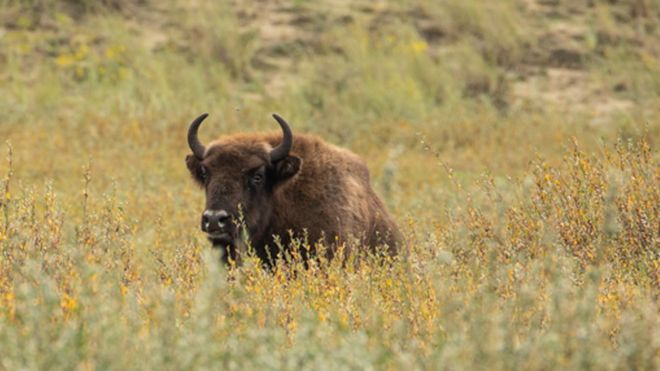 |
| European bison |
The European bison is one of the most majestic of Eurasia's animals. Like its American cousin, it had also suffered terribly in the hands of humans across its Eurasian homeland eventually becoming extinct in the wild in 1927. By that year, fewer than 50 of these gigantic animals remained mostly in captivity. Thankfully, the bison was saved with captive breeding programs and reintroductions throughout its former haunts over a span of several decades. The European bison now exists in the forests of mainland Europe and Russia, with majority of free-ranging herds living in Poland. But now, it has been recently reported that the bison will be introduced in the United Kingdom as part of a 1-million-pound conservation project. The project, initiated by the Kent Wildlife Trust and the Woodland Trust, is focused on helping to manage Blean Woods near Canterbury. The release site is a 500-hectare area with other grazing animals such as Konik horses. Conservationists explained that the bison would be beneficial in the restoration of the habitat and the wildlife. This would be seen in their behavior of felling trees by rubbing against them to create space for sunlight which would help plants such as cow wheat to grow. The cow wheat is known to attract a butterfly known as the heath fritillary. In addition, when the bison take dust baths, they would create patches of bare earth in the process which are good for lizards and rare cultivable weeds. Also, their stripping of tree bark would create standing dead wood for fungi and insects like stag beetles. The bison will be introduced by spring of 2022. Preparation by the charities will commence in the next 18 months, which includes establishing a fenced enclosure. The project will be funded by the People's Postcode Lottery Dream Fund.
 |
| Blean Woods |
I find it very amazing that the European bison will be introduced in the United Kingdom in the coming. I had long believed and understood that these bison are native to mainland Europe. However, they happen to be closely related to the prehistoric steppe bison which once roamed Britain. This means that the introduction efforts of bison in Britain will probably not have any negative impact on the local wildlife. Conservationists pointed out the ecological benefits the bison will have on the ecosystem. For example, Paul Hadaway of Kent Wildlife Trust stated that using the bison to restore the local habitat is essential to establishing bio-abundance in the landscape. He further added that a "nature-based solution is the right one to tackling climate and nature crisis we now face." I think it would not hurt to introduce the bison on an experimental basis and closely monitor the animals to see how they are doing and how the ecosystem is functioning. This way, everyone would know the overall health of Blean Woods.
View article here
No comments:
Post a Comment